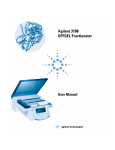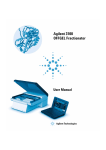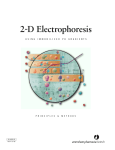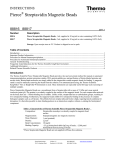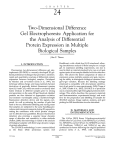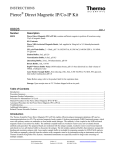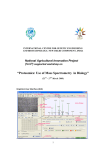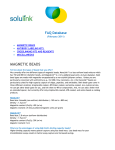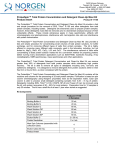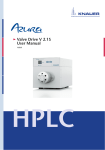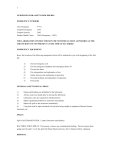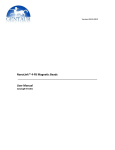Download Agilent 3100 OFFGEL Fractionator Kit
Transcript
Agilent 3100 OFFGEL Fractionator Kit Quick Start Guide Before you begin 2 Reagent Kit Checklist 2 Required Equipment and Reagents 2 Sample and Stock Solution Preparation Notes 3 Procedures 5 To prepare solutions and sample for Protein Fractionation 5 To prepare solutions and sample for Peptide Fractionation 8 To assemble the IPG strips, frames and electrodes 10 Best Practices 17 To start a fractionation run 19 To retrieve the fractions 19 To run a test sample 19 Reference 22 Product Information 22 Literature Reference 22 Troubleshooting 22 OFFGEL Electrophoresis is a novel technique that separates proteins or peptides according to their isoelectric points, whereby the separated components are recovered in liquid fractions. Downstream sample processing steps like protein digestion and liquid chromatography can be easily interfaced with this method for multi-dimensional separations of complex samples. This guide describes the proper use of the reagent kits with the Agilent 3100 OFFGEL Fractionator. Agilent Technologies Before you begin Reagent Kit Checklist Before you begin Reagent Kit Checklist • IPG Strips (store at -20°C) • Frames • Cover Seal • Urea in 50 mL bottle (25.2 g, electrophoresis grade) • Thiourea (9.1 g, analytical grade) • DTT (dithiothreitol, 600 mg, electrophoresis grade), store at 4°C • Glycerol Solution • OFFGEL buffer (containing ampholytes, store at 4°C) • Electrode Pads • Mineral Oil (Cover Fluid) Required Equipment and Reagents • 3100 OFFGEL Fractionator • OFFGEL Tray • OFFGEL Electrodes • dH2O • Adjustable Pipettors – 100 µL, 200 µL, & 1000µL (also, 20 µL & 200 µL adjustable multichannel pipettors recommended) • 50 mL conical tube for making Peptide OFFGEL Stock Solution • 5 to 15 mL conical tubes for Prepared OFFGEL Samples • Tweezers • Reservoir trays for multichannel pipettors 2 OFFGEL Fractionator Kit User Guide Before you begin Sample and Stock Solution Preparation Notes Sample and Stock Solution Preparation Notes • Always wear laboratory gloves when handling and preparing solutions, samples, apparatus, etc. to prevent contamination of samples and solutions (i.e. skin keratin). • The maximum protein load will vary based on the complexity and solubility of each sample. For complex samples such as serum/plasma, cell lysate, and tissue samples we recommend a range of 50 µg to 5 mg. For purified single proteins or simple mixtures, the maximum capacity will be less than that for complex samples. • Substances that can interfere with IEF separation, such as salts, should be avoided. (Total salt concentration in the sample should not exceed 10 mM for optimal fractionation.) Samples can be desalted via dialysis, mRP desalting (ref. 1), or buffer exchanged into a low-salt buffer such as 10 mM Tris-HCL, pH 7.6. • The sample should not be in a buffer with greater than 10 mM concentration. Non-ionic or zwitterionic detergents like CHAPS can be used in OFFGEL electrophoresis but may interfere with downstream analysis by mass spectrometry and are, therefore, not recommended. • For use with the 24 cm strip / 24 well frame OFFGEL kit: • If your sample is dried, prepare the required amount of 1X OFFGEL solution (2.88 mL 1.25X OFFGEL Stock Solution + 0.72 mL dH2O) and resuspend your sample directly in this solution. • If your sample is in an OFFGEL compatible solution of less than 0.72 mL, add (0.72 mL minus sample volume in mL) mL dH2O to 2.88 mL 1.25X OFFGEL Stock Solution, mix, and then add your sample. • If your sample is in greater than 0.72 mL of an OFFGEL compatible solution, concentrate the sample down to less than or equal to 0.72 mL. OFFGEL Fractionator Kit User Guide 3 Before you begin Sample and Stock Solution Preparation Notes • For use with the 12 cm strip / 12 well frame OFFGEL kit: • If your sample is dried, prepare the required amount of 1X OFFGEL solution (1.44 mL 1.25X OFFGEL Stock Solution + 0.36 mL dH2O) and resuspend your sample directly in this solution. • If your sample is in an OFFGEL compatible solution of less than 0.36 mL, add (0.36 mL minus sample volume in mL) mL dH2O to 1.44 mL 1.25X OFFGEL Stock Solution, mix, and then add your sample. • If your sample is in greater than 0.36 mL of an OFFGEL compatible solution, concentrate the sample down to less than or equal to 0.36 mL. • Proteins in the sample need to be fully denatured, reduced and solubilized prior to fractionation. The Protein OFFGEL Solution contains Urea, DTT, and Thiourea to accomplish this. 4 OFFGEL Fractionator Kit User Guide Procedures To prepare solutions and sample for Protein Fractionation Procedures To prepare solutions and sample for Protein Fractionation WA R N I N G Wear hand and eye protection and follow good laboratory practices when you prepare and handle reagents and samples. 1 Prepare Protein OFFGEL Stock Solution (1.25X). a Locate the bottle labelled “Urea”. Add the following components to the Urea bottle: Table 1 Protein OFFGEL Stock Solution (1.25X) Tube Amount Comment Thiourea Entire tube Rinse with dH2O if needed DTT Entire tube Rinse with dH2O if needed. Glycerol Solution 6 mL OFFGEL Buffer 600 µL Choose the appropriate ampholytes depending on the IPG strip used – pH 3-10 or 4-7. b Mix the contents and bring the total volume to the 50 mL mark on the bottle with dH2O. You may need to warm the solution in warm water to dissolve. OFFGEL Fractionator Kit User Guide 5 Procedures To prepare solutions and sample for Protein Fractionation CAUTION Do not let water temperature exceed 37° C. Elevated temperatures cause urea to hydrolyze to isocyanate, which modifies proteins by carbamylation. c Label the 50 mL bottle depending on which ampholytes are used. You can aliquot the OFFGEL Stock Solution into smaller tubes to avoid multiple freeze/thaw cycles. OFFGEL Stock Solution can be stored at -20°C for four months. 2 Prepare Protein IPG Strip Rehydration Solution. Follow the table below for a single sample: Table 2 Protein IPG Strip Rehydration Solution 24 cm strip / 24 well frame 12 cm strip / 12 well frame Protein OFFGEL Stock Solution (1.25X) 0.96 mL 0.56 mL dH20 0.24 mL 0.14 mL Total Solution 1.2 mL 0.7 mL If you are using a multichannel pipettor you will want to make extra IPG Strip Rehydration Solution so there is excess in the reservoir tray. 3 Prepare the OFFGEL Protein Sample. Add the OFFGEL Stock Solution (1.25X) to each sample in the amount indicated in Table 3. Table 3 OFFGEL Protein Sample 24 cm strip / 24 well frame 12 cm strip / 12 well frame Protein OFFGEL Stock Solution (1.25X) 2.88 mL 1.44 mL sample* 0.72 mL 0.36 mL * The final salt concentration in the diluted sample should not exceed 10 mM. 6 OFFGEL Fractionator Kit User Guide Procedures To prepare solutions and sample for Protein Fractionation Multiple Runs If you will be doing more than one run at a time, or if you are running the same sample in multiple lanes, you can use Table 4 and Table 5 to make multiple batches of the rehydration buffer and sample. Table 4 1 Run 2 Runs 4 Runs 8 Runs Stock Solution (1.25X) 0.96 mL 1.92 mL 3.84 mL 7.68 mL dH20 0.24 mL 0.48 mL 0.96 mL 1.92 mL Total Rehydration Solution 1.2 mL 2.4 mL 4.8 mL 9.6 mL Stock Solution (1.25X) 2.88 mL 5.76 mL 11.52 mL 23.04 mL Sample 0.72 mL 1.44 mL 2.88 mL 5.76 mL Total Prepared OFFGEL Sample 3.6 mL 7.2 mL 14.4 mL 28.8 mL 1 Run 2 Runs 4 Runs 8 Runs Stock Solution (1.25X) 0.56 mL 1.12 mL 2.24 mL 4.48 mL dH20 0.14 mL 0.28 mL 0.56 mL 1.12 mL Total Rehydration Solution 0.7 mL 1.4 mL 2.8 mL 5.6 mL Stock Solution (1.25X) 1.44 mL 2.88 mL 5.76 mL 11.52 mL Sample 0.36 mL 0.72 mL 1.44 mL 2.88 mL Total Prepared OFFGEL Sample 1.8 mL 3.6 mL 7.2 mL 14.4 mL Table 5 OFFGEL Fractionator Kit User Guide 24 cm/24 wells 12 cm/12 wells 7 Procedures To prepare solutions and sample for Peptide Fractionation To prepare solutions and sample for Peptide Fractionation 1 Prepare Peptide OFFGEL Stock Solution (1.25X): a Add the components in Table 6 to an empty 50 mL container: Table 6 Peptide OFFGEL Stock Solution (1.25X) Tube Amount Glycerol Solution 6 mL OFFGEL Buffer (can be omitted at the cost of some loss of resolution if downstream analysis shows interference with ampholytes) 600 µL Comment Choose the appropriate ampholytes depending on the IPG strip used – pH 3-10 or 4-7. b Mix contents and bring total volume to the 50 mL mark on the tube with dH2O. c Label the 50 mL tube depending on which ampholytes are used. You can aliquot the OFFGEL Stock Solution into smaller tubes to avoid multiple freeze/thaw cycles. OFFGEL Stock Solution can be stored at -20°C for four months. 2 Prepare Peptide IPG Strip Rehydration Solution. Refer to Table 7 for a single sample. Table 7 8 Peptide IPG Strip Rehydration Solution 24 cm strip / 24 well frame 12 cm strip / 12 well frame Peptide OFFGEL Stock Solution (1.25X) 0.96 mL 0.56 mL dH20 0.24 mL 0.14 mL Total Solution 1.2 mL 0.7mL OFFGEL Fractionator Kit User Guide Procedures To prepare solutions and sample for Peptide Fractionation If you are using a multichannel pipettor you will want to make extra IPG Strip Rehydration Solution so there is excess in the reservoir tray. 3 Prepare OFFGEL Peptide Sample. For each sample to be prepared, add the OFFGEL Stock Solution (1.25X) to each sample in the amount indicated in Table 8. Table 8 OFFGEL Peptide Sample Peptide OFFGEL Stock Solution (1.25X) sample * 24 cm strip / 24 well frame 12 cm strip / 12 well frame 2.88 mL 1.44 mL 0.72 mL 0.36 mL * The final salt concentration in the diluted sample should not exceed 10 mM. If you will be running the same sample in multiple lanes you can use Table 4 and Table 5 to make multiple batches of the sample. OFFGEL Fractionator Kit User Guide 9 Procedures To assemble the IPG strips, frames and electrodes To assemble the IPG strips, frames and electrodes 1 Place tray in orientation shown with fixed electrode side on the left and tray handle on the right (see Figure 4 in Section 1 of the Agilent 3100 User Manual). 2 Remove the protective backing from the IPG strip gel. 3 Place the IPG strip in the tray with the gel side up. Observe correct tray orientation with handle on the right and fixed electrode slots on the left. 4 Pull the strip as far left as possible until the strip touches the left edge of the tray. Low pH side (Anode) marked with a “+” must be at the left side, where the fixed electrode will be attached. (See Figure 4 in Section 1 of the Agilent 3100 User Manual.) 10 OFFGEL Fractionator Kit User Guide Procedures To assemble the IPG strips, frames and electrodes 5 Keeping the right side of the frame slightly elevated, place the left side of the frame against the mechanical stop (about 2 cm, or 1 inch, from the end of the tray). Be careful not to move or crimp the strip while placing the frame down. 6 Lower the right side of the frame and press the frame down until it snaps in. OFFGEL Fractionator Kit User Guide 11 Procedures To assemble the IPG strips, frames and electrodes 7 Pipette 40 µL of IPG Strip Rehydration Solution into each of the wells. Be careful not to touch the gel. If you are using a multichannel pipettor, prepare a larger batch of IPG Strip Rehydration Solution. (Multichannel pipettors are very useful for this step.) 8 After pipetting, gently tap the tray onto the desk, to ensure that the IPG Strip Rehydration Solution reaches the gel. 9 Visually inspect to determine that the IPG Strip Rehydration Solution has wetted the gel surfaces. The IPG Strip Rehydration Solution does not need to completely cover the exposed gel in the wells. 10 From the container labelled Electrode Pads, remove four pads for each IPG strip. 11 Using tweezers, wet one electrode pad with IPG Strip Rehydration Solution. 12 Place one wetted electrode pad on each protruding end of the IPG strip. Make sure that there is no gap between the pad and the frame. 12 OFFGEL Fractionator Kit User Guide Procedures To assemble the IPG strips, frames and electrodes 13 Place a second wetted electrode pad on top of the first electrode pad. Each end of IPG strip should now be covered by 2 pads each which are on top of each other. The upper pads should be replaced every 24 hours of fractionation (see step 23). 14 Wait 15 minutes to allow the IPG gel to swell. 15 After allowing 15 minutes for reswelling of the gel load 150 µL of Prepared (Protein or Peptide) OFFGEL sample (OFFGEL stock solution + Sample) into each well: • 24 cm strip / 24 well frame: 150 µL X 24 wells = 3600 µL • 12 cm strip / 12 well frame: 150 µL X 12 wells = 1800 µL OFFGEL Fractionator Kit User Guide 13 Procedures To assemble the IPG strips, frames and electrodes 16 Place the cover seal over the frame and press down gently on each well to secure proper fit. Be careful not to move the frame in the tray. 17 Reapply 10 µL of dH20 onto the electrode pads at each of the IPG gel ends. Be careful not to move the pads. 18 Place the tray on the instrument platform. 14 OFFGEL Fractionator Kit User Guide Procedures To assemble the IPG strips, frames and electrodes 19 Pipette cover fluid (mineral oil) onto the gel strip ends in several steps. When pipetting cover fluid, use caution not to move the electrode pads. • For 24 well frames a Pipette 200 µL cover fluid onto the anode end (fixed electrode) of the IPG strip. Pipette 400 µL cover fluid at the cathode side (movable electrode). b After 1 minute, reapply an additional 200 µL cover fluid to both ends of the IPG strip. c After 3 minutes add an additional 200 µL cover fluid onto the anode end (fixed electrode) of the IPG strip. (The cover fluid should not extend higher than 1/2 the height of the tray grooves.) • For 12 well frames a Pipette 200 µL cover fluid onto the anode end (fixed electrode) of the IPG strip. Pipette 1 mL cover fluid at the cathode side (movable electrode). b After 1 minute, reapply an additional 200 µL cover fluid to both ends of the IPG strip. (The cover fluid should not extend higher than 1/2 the height of the tray grooves.) 20 Select the fixed electrode [Anode] (see Figure 4 in Section 1 of the Agilent 3100 User Manual) and place the two tabs on the electrode into the slots on the left side of the tray. Rotate the fixed electrode down into position over the electrode pad (insert). Push down until the fixed electrode clicks into place. Slide the tray without lifting it into the anode connector. OFFGEL Fractionator Kit User Guide 15 Procedures To assemble the IPG strips, frames and electrodes 21 Insert the moveable electrode [Cathode] (Figure 4 in Section 1 of the Agilent 3100 User Manual) in the orientation shown and push down until it clicks in place. (Lane labels on the electrode should read A-H on the right side with A at the top of the electrode.) The movable electrode should touch the end of the frame. Be sure that the moveable electrode makes contact with the electrode pad (insert). If not, gently reposition the electrode pad. 22 Close the lid and start the fractionation. 23 Every 24 hours of operation, exchange the upper electrode pads with fresh pads wetted in deionized water: a Open the lid (this will pause the fractionation). b Remove the movable electrode. c Carefully slide the tray to the right. d Remove the fixed electrode without lifting the tray from the platform. e Exchange the pads using tweezers. f Refill cover fluid if needed (some creeping of cover fluid to empty neighboring lanes is normal and does not impact fractionation quality). Do not just reapply OFFGEL solution or water to electrode pads during the fractionation. The liquid can seep between tray and IPG strip and current can bypass the sample. 16 OFFGEL Fractionator Kit User Guide Procedures Best Practices Best Practices • If you are not using all lanes, start with loading the samples from the middle lanes of the tray outward. • If sample is leaking out of the frame, remove the sample with a pipette (the sample may be used again), remove the frame, clean and dry the tray and start over using a new IPG strip. Sample leakage can be avoided by making sure the frame is snapped onto the tray tightly and the IPG strip is rehydrated completely. • The upper electrode pads needs to be exchanged with fresh electrode pads wetted in deionized water every 24 hours. • Cover fluid may be reapplied during the fractionation but should not be added to a higher level than 1/2 height of the tray groove. • Typical starting voltages (depending on concentration of sample and salt content) are 200 to 1500V. If the starting voltage is above 1500 V, there may be a contact issue (electrode does not contact electrode pad/IPG strip). If starting voltage is below 100 V, the salt concentration of the sample may be too high. To improve poorly resolving protein samples, precede the standard method with a ramp up phase to allow slow sample entry into the gel (e.g. 300 V for 2 h, followed by 600 V and 1500 V for 2 hours each). See the User Manual for modification of methods. • To eliminate leakage and cross contamination between samples, do not reuse frames and seals. See part numbers 5188-8012 and 5188-8013. OFFGEL Fractionator Kit User Guide 17 Procedures Best Practices • Remove additives after fractionation: • Salt, urea: Desalt OFFGEL protein fractions if they are to be digested or analyzed directly by MS. To desalt, use mRP (Agilent) or Zeba columns (Pierce). This step removes urea, thiourea and glycerol. • Glycerol: Glycerol in peptide fractions can interfere with speed vac concentration (increased viscosity), direct injection into reverse phase LC or with crystallization on a MALDI target. Glycerol can be removed by dialysis, LC trapping columns, mRP (Agilent) or C18 ZipTips (Millipore). You can also omit glycerol from the OFFGEL solution. This may lead to reduced liquid levels in some wells. These wells can be refilled every few hours of fractionation with ampholyte- and glycerol-free OFFGEL solution. • Ampholytes: Ampholytes can interfere with MS ionization. The amount of ampholytes can either be reduced to 0.25% (a quarter of the standard concentration) or they can be omitted completely in the OFFGEL solution. This will lead to a slight decrease of resolution. Also, ampholytes can easily be removed if the sample is cleaned with reverse phase-LC using a prior trapping column. • For better visibility during rehydration, bromphenol blue may be added to rehydration or OFFGEL solution at a concentration of 0.002%. Fractionation times and performance are not impacted by bromphenol blue. • In case of low liquid levels in external wells when fractionating proteins: it is normal for external wells to have reduced liquid levels after fractionation. Proteins and DTT carrying a charge in the alkaline region drag water which leads to wells with lower protein concentration to be lower in liquid. OFFGEL solution without ampholytes can be refilled in those wells during the run. Also, the glycerol concentration can be increased to 10% to increase the viscosity of the solution. It may help to either reduce the DTT concentration or to avoid the DTT altogether by treating the sample with iodoacetamide and alkylation prior to OFFGEL. 18 OFFGEL Fractionator Kit User Guide Procedures To start a fractionation run To start a fractionation run • Please see the User Guide (Section 4) for operation of the 3100 OFFGEL including starting a run. A list of available methods is shown in the manual in section 4, page 65, “Performing a fractionation”. To retrieve the fractions After fractionation, be careful when you remove the cover seals. Do not lift the well frames or contaminate the fractions with cover fluid. • Use a pipette or a multipipettor to carefully pipette the Sample Solution from the frame wells while avoiding aspirating the IPG gel. Please see the User Guide (Section 4) for details on how to export results. To run a test sample Beta-lactoglobulin (Agilent part number 5188-6428 - OFFGEL Protein Test Sample) can be used to evaluate the performance of the system. 1 Prepare the beta-lactoglobulin Test Sample Stock by weighing 1.0 mg and placing it in an Eppendorf (or other appropriate container) with 1.0 mL of dH20. This Test Sample Stock can then be used to make a Prepared OFFGEL Sample according to the directions in “Prepare the OFFGEL Protein Sample.” on page 6. Recommended amount of the Protein Test Sample is 50 µg. 2 Combine the components in the table below to prepare the Test Sample. OFFGEL Fractionator Kit User Guide 19 Procedures To run a test sample Table 9 Test Sample Preparation 24 cm strip / 24 well frame 12 cm strip / 12 well frame Test Sample Stock 50 µL 50 µL dH20 670 µL 310 µL Protein OFFGEL Stock Solution 2.88 mL 1.44 mL 3 Fractionate this Test Sample as you would a Prepared OFFGEL Sample using either the 24 well or 12 well default methods: OG24PR00 or OG12PR00. 4 If the instrument and reagent kits are functioning correctly, the beta-lactoglobulin should be in the following OFFGEL fractions: • 12 cm, pH 3-10 IPG strip – well 3 • 12 cm, pH 4-7 IPG strip – well 4 • 24 cm, pH 3-10 IPG strip – well 5,6 • 24 cm, pH 4-7 IPG strip – well 7,8,9 See Figure 1 on page 21. 20 OFFGEL Fractionator Kit User Guide Procedures To run a test sample Figure 1 Beta-lactoglobulin Protein Test Sample in well 3 of a 12 cm, pH 3-10 IPG strip. (Gel-like image from an Agilent 2100 BioAnalyzer analysis of wells 1 through 9 using the Protein 80 Chip Kit. 6 µL of each OFFGEL fraction were used per analysis without additional sample preparation). Lane 1 shows the diluted sample prior to fractionation. Lanes 2 through 10 show OFFGEL fractions 1 through 9. OFFGEL Fractionator Kit User Guide 21 Reference Product Information Reference Product Information Part Number Product Description 5188-6424 3100 OFFGEL High Res Kit, pH 3-10 5188-6425 3100 OFFGEL Low Res Kit, pH 3-10 5188-6426 3100 OFFGEL High Res Kit, pH 4-7 5188-6427 3100 OFFGEL Low Res Kit, pH 4-7 5188-6444 3100 OFFGEL Starter Kit 5188-6428 OFFGEL Protein Test Sample 5188-8012 3100 OFFGEL 12 Well Frame Set 5188-8013 3100 OFFGEL 24 Well Frame Set G3100-60007 Tray Set – includes 4 replacement trays G3100-60002 Electrode Assy – includes 1 tray, 1 fixed electrode and one moveable electrode G4208-68700 USB-Memory Stick Kit – includes 256 MB USB flash memory Literature Reference 1 “A Rapid Method to Desalt and Concentrate Proteomic Samples Using the Agilent mRP-C18 Column”, Agilent Publication Number 5989-2506EN, (2005) Troubleshooting For troubleshooting information, refer to Section 6 of the Agilent 3100 User Manual. 22 OFFGEL Fractionator Kit User Guide Notes Notes OFFGEL Fractionator Kit User Guide 23 www.agilent.com © Agilent Technologies, Inc. 2006 - 2010 Printed in Germany Fifth Edition, September 2010 *G3100-90113* G3100-90113 Agilent Technologies
























